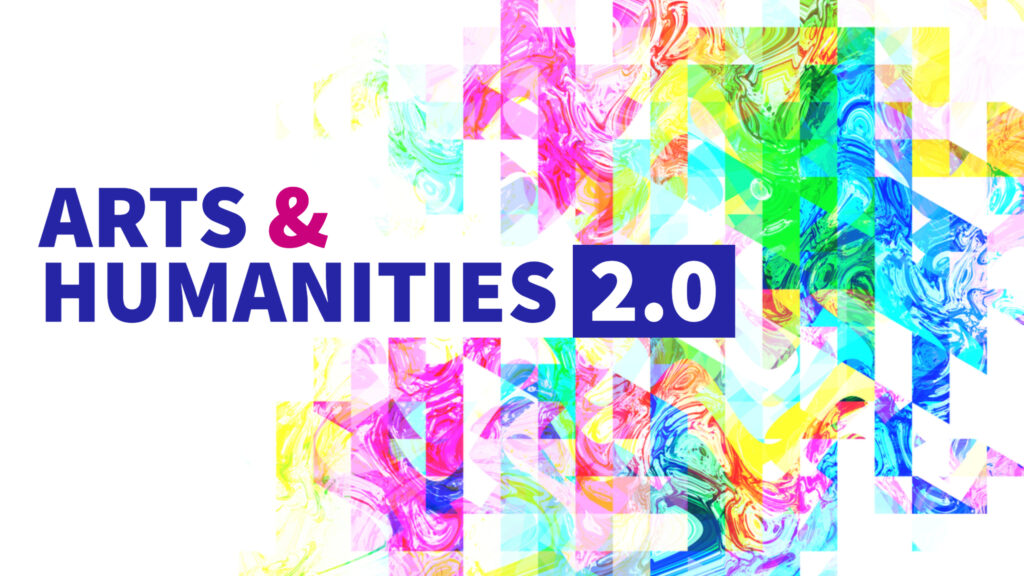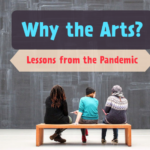
Arts & Humanities 2.0
Re-Imagining Graduate Education and Study at UC Riverside and Beyond
–
Economic disruptions and sustained inequities at public universities in the first decades of the 21st century have seemingly reduced the function of higher education to a lowest common denominator: its utility in securing employment for graduates, regardless of whether that employment makes use of the intellectual skills developed by their university training, especially in the arts and humanities. Many graduate students question the utility of pursuing a degree in the arts or humanities when the costs of education often appear to outweigh the returns. Faculty in graduate programs are asking how they can preserve the integrity of advanced academic training amidst concerns that graduating students are unprepared for employment beyond academia.
The Arts & Humanities 2.0 series at the Center for Ideas and Society hosts a sequence of conversations that address pressing issues of graduate education in the UC system, and at UCR in particular. A platform for open discourse, Arts and Humanities 2.0 launches on March 10 with a presentation and discussion of “Stories from the Field,” a short publication that details narratives and numbers that speak of the conditions – and the possible futures – facing today’s UC humanities PhDs.
Submit proposals for events in this series to Jeanette Kohl and/or Dylan Rodríguez.
Nov 10 at 10 am – 5 PM | 12:15 lecture with hybrid access
Download optional workshop readings. Readings are not required for attendees.
Description
The workshop, “Race, Neoliberalism and the University”, will focus on the ongoing transformation of the university in the post-Cold-War decades and the impact of neoliberalism’s efforts to remake social and cultural institutions in the service of a new regime of capital accumulation and disciplinary regulation. Educational institutions, and in particular the university, have been targeted by neoliberal concepts of management, efficiency, auditing and assessment and face continual and increasing pressure to remake education as a public good into education as a commodity or as a resource for “R & D” conducted with state funding but serving the goals of corporate profit. The increasing privatization of university funding, whether by individual “philanthropic” donors or by corporate research grants, has led to a pattern of rising controls on academic freedom and inquiry. At the same time, students are increasingly seen on the one hand as financial resources for a university system increasingly dependent on student fees and on the other as customers or clients to be served education as a commodity directed at the accumulation of job skills that once again serve corporate interests.
Since the 1960s, the countervailing force that has challenged the systemic function of the university as an institution for managing and segmenting the population has come primarily from faculty and students working in collaboration with social movements to challenge the racial segregation and anti-democratic ends of higher education. These efforts to challenge the systemic racism of the university have been theorized across a range of interdisciplinary knowledge formations and by actors within and outside the formal institutions of the academy, from Black Study to Indigenous Studies and Critical Race Theory. As an intellectual project, these tendencies have sought to promote democratization and desegregation of the university and to direct both its pedagogy and its research towards ends that serve the public good: they are, in effect, projects that seek the decolonization of the university as an integral part of a larger struggle for decolonization.
Since the 1960s also, corporate interests in collaboration with the state have sought to contain the push towards democratization both in the university and in society as a whole. Alarmed by anti-imperialist protests against the Vietnam War, by the radical turn of the Civil Rights Movement and by the rise of radical anti-racist social movements, conservative thinkers from Justice Powell to Samuel Huntington came to regard democracy and education as forces to be contained in the name of the survival of capitalism. The notorious Trilateral Commission Report diagnosed the social unrest of the 1960s as a consequence of the over-education of the population and an excess of democracy and recommended a reduction of access to education and the curtailment of the economic expectations of the large majority of the population. Such analyses spawned an extensive conservative backlash that has affected and continues to guide the disciplining of the university, including cuts to public support of higher education (and public schooling); increases in the costs of education to students and in accumulated loan debt; reduction in the numbers of tenured faculty and the increasing reliance on contingent instructors, the rollback of the work of desegregation and affirmative action and their replacement with a series of rubrics from Multiculturalism to “Excellence and Diversity” to “inclusivity”, each of which sought to limit the transformation of the university and contain the effects of desegregation to assimilative conformity to its existing protocols or what Denise da Silva has called “engulfment.” At the same time, the university nationwide has undergone a steady process of administrative bloating, the outsourcing of its functions, and an increasing bureaucratization of its pedagogical mission in the name of efficiency, accountability and cost-cutting.
Tendencies that have been ongoing since the 1960s have been exacerbated since the end of the Cold War by the withdrawal of federal funding from research, some of which flowed down from the sciences that performed militarily useful research to the humanities and social sciences [Chomsky et al]; by the loss of the university’s ideological mission in maintaining the appearance of a conjunction between capitalism and democracy and free and critical inquiry; by the neoliberal push for privatization of education as part of its new regime of accumulation (education represents 6.1% of GDP; higher education 2.6%: NCES); and by corporate driven emphasis on STEM subjects and an ongoing and concerted attack on the arts, humanities and critical social sciences. Administrative, and in many cases, faculty acquiescence in and accommodation, if not promotion, of these tendencies has accelerated a transformation of the university that is steadily undercutting its democratizing mission as a public good, exacerbating its long-standing racial segregation, and subordinating the spaces for free and questioning inquiry that are essential to the work of social justice and the remaking of the university into a site that fosters critical thought and alternative imaginaries we so urgently need at this time.
The languages of “civility”, “inclusion” and “community”, and the more polemical “cancel culture”, have to date shown themselves to be alibis for authoritarian acts of censorship and the containment of on-campus social movements, whether with regard to Black and Indigenous demands or to Palestine solidarity.
The aim of the workshop is to create a space for faculty and graduate students to consider the forces that are impacting the current “crisis of the university”, their genealogy and their effects, whether in terms of the differentially increasing work load on faculty and on staff, the increasing casualization of academic labor, the containment of anti-racist and democratizing projects on campus, the intensifying debt and labor burdens on students, or the underfunding of departments, faculty research, and graduate study, among many other issues. But hopefully this will also be an occasion to map out the spaces still available to us on and off campus to further our intellectual and political agendas, to engage with student and social movements, and to plan collectively for surviving and thriving together.
All the sessions will be open to anyone wishing to attend. We will be joined by faculty and graduate students from UCI and UCSC, including:
Nick Mitchell (Feminist Studies and Critical Race and Ethnic Studies, UC Santa Cruz), author of Discipline and Surplus: Black Studies, Women’s Studies, and the Dawn of Neoliberalism and The University, in Theory: Essays on Institutional Knowledge.
Rei Terada (Department of Comparative Literature, UC Irvine), author of recent articles on race and the history of philosophy and the forthcoming Metaracial Logic: Hegel, Antiblackness, and Political Identity
Anne Fosberg, Graduate Student, Feminist Studies, University of California, Santa Cruz.
Organized by David Lloyd (Department of English, UC Riverside), author of Culture and the State and Under Representation: The Racial Regime of Aesthetics.
Sponsored by the Center for Ideas and Society through a grant from the University of California Office of the President Multi-campus Research Programs and Initiative Funding and the UCR Department of English.
Cosponsored by Departments of Black Study, Comparative Literature & Languages, Holstein Family and Community Chair, Religious Studies, Theatre, Film, and Digital Production, Dance, Hispanic Studies, English, Speculative Fiction and the Cultures of Science, Media and Cultural Studies, and History.
Schedule
10 am-12 pm session: Workshop and Presentation (in-person)
- David Lloyd (UCR) introduces workshop
- Anne Fosburg (UCSC): “The Violence of Improvement: Settler Colonialism and the Land-Grant University”
12.15–1.45 pm: Lecture (hybrid)
- Nick Mitchell (UCSC): “Unwaged War: The Third World Strike as an Occasion for Theory.”
- Lunch provided for in-person attendees
- Webinar link for hybrid access: https://ucr.zoom.us/j/96838868490
2 pm – 4 pm: Workshop and Presentations (in-person)
- Rei Terada (UCI) and John Gillespie (UCI), on institutional resistance to modes of critical thinking and contesting the boundaries of the institution
4.00-5.00 pm: Reception
 March 10, 2022 @ 1:00 PM | Virtual event
March 10, 2022 @ 1:00 PM | Virtual event
What can CHASS departments do to improve the experiences and professional prospects of graduate students? Join us for a discussion on Stories from the Field, a data booklet* that charts the economic outcomes and career trajectories for UC humanities PhDs against those of their peers in other disciplines. Presentation will provide an overview of the project, including key takeaways of the report that can inform and reshape how departments and university administrations approach graduate education in the humanities. (*Limited number of printed copies available for UCR participants. Request a hard copy.)
Presentation from Kelly Anne Brown, Associate Director, UCHRI
Followed by Q&A and roundtable conversation with CHASS faculty, including Sherryl Vint, Cathy Gudis, Adrián Félix and Aleca Le Blanc.
About Stories from the Field
The project, produced by UCHRI and Humanists@Work, was funded by a grant from the Council of Graduate Schools (CGS) to the UC Career Pathways project. The grant supported two distinct, but related, data collection projects:
- Doctoral Survey.UCOP and CGS conducted a broad survey of UC doctoral cohorts (representing years 2001-2, 2002-3, 2008-9, 2009-10, 2013-14, and 2014-15). This effort to survey alumni is part of a national effort to better understand PhD outcomes and the professional landscape for our alumni.
- Alumni Focus Groups.Throughout 2019, UCHRI & Humanists@Workconducted 6 alumni focus groups and 3 in-depth interviews with UC PhD alumni working outside the professoriate.
About Humanists@Work
Humanists@Work is a systemwide graduate student professionalization initiative established by UCHRI in 2013. In addition to a wide variety of activities, such as a paid graduate student advisory committee, LinkedIn group with over 600 PhDs, and more, the project hosted 8 day-and-a-half long workshops in collaboration with 6 UC campuses. Alongside the Stories booklet, their website contains a Stories from the Field section that includes the booklet and a (hopefully) handy user’s guide. A new series, Alumni@Work, features innovative alumni profiles, with questions that go beyond the usual transferable skills conversations. Coming soon: “Under Review,” a new podcast series led by two graduate students that embeds approaches to career diversity within larger discussions of contingency, educational reform, and racial and socioeconomic diversity.
Co-sponsored by the UCR Graduate Division and the Center for Ideas and Society.
 Why the Arts? Lessons from the Pandemic
Why the Arts? Lessons from the Pandemic
April 20, 2022 @ 2:00 pm
Hybrid / CHASS Interdisciplinary South, Room 1111
REGISTER: https://bit.ly/whythearts_Apr20
A roundtable discussion as we transition “back” to opening venues for the arts on campus, in the professional world, and in arts education. What does it mean to return to working in-person after such a long period of being away? What have we gained? What have we lost? How do hybrid modalities present opportunities for theatre spaces, museums, music, art and dance spaces to rethink how we make, share and educate in the arts?
Panelists include:
Barbara Fuchs (MLA President, 2021 & Department of English and Spanish and Portuguese, UCLA)
Kim Yasuda (Department of UCSB)
Susan Ossman (Anthropology and Global Studies, UCR)
Patricia Cardoso (TFDP, UCR)
Donatella Galella (TFDP, UCR)
Kimberly Guerrero (TFDP and CWPA, UCR)
Rickerby Hinds (TFDP, UCR)
Stuart Krieger (TFDP and CWPA, UCR)
Bella Merlin (TFDP, UCR)
Root Park (TFDP, UCR)
Robin Kello (English, UCLA)
Esther Banegas Gatica (CWPA, UCR)
Paige Goodman (CWPA, UCR)
Aaron Higareda (CWPA, UCR)
Karly Thomas (CWPA, UCR)
Moderated by Erith Jaffe-Berg (TFDP, UCR)
—
Sponsored by the Department of Theatre, Film and Digital Production, the Being Human project and the Arts and Humanities 2.0 initiative at the Center for Ideas and Society. Funding is provided by the University of California Office of the President Multi-campus Research Programs and Initiative Funding.
—
Organized by Erith Jaffe-Berg
Sponsored by the UCR Department of Theatre, Film and Digital Productions and the Center for Ideas and Society through a grant from the University of California Office of the President Multi-campus Research Programs and Initiative Funding.
The 2022/23 sequence will conclude with a roundtable on May 5, organized jointly with the Dean of Graduate Division, during which faculty and graduate students will have the opportunity to share their experiences at UCR and discuss strategies for the future.
Details forthcoming.